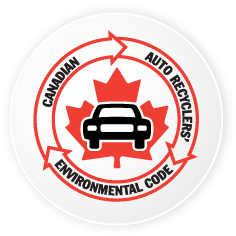 |
Refrigerants |
 |
 |
|
 |
Does a certified or licensed mechanic or technician remove the refrigerants from end-of-life vehicles? |
 |
Does the mechanic or technician keep a log of all end-of-life vehicles that have been evacuated? |
 |
Does the mechanic or technician tag or mark vehicles once the refrigerant has been removed; |
 |
Do you give or dispose of the refrigerants to a certified or licensed businessor recycler? |
 |
Do you keep all records for a minimum of 2 years? |
 |
|
 |
Fluids |
 |
 |
|
 |
Are all oils, antifreeze, transmission fluids, brake fluids, and windshield washer fluids removed from vehicles before
the hulk is stored or crushed? |
 |
Are the fluids stored in a safe covered location with adequate containment (i.e., secondary containment) that will catch the
fluids if the storage containers fail? |
 |
Does the transporter have a license to transport hazardous fluids issued by the Provincial gov-
ernment and do you keep the shipping records for a minimum of 2 years? |
 |
Do you know the thresholds of spilled hazardous liquids that must be reported to the Provincial
Emergency Program? |
 |
Are small spills and leaks on the ground cleaned up? |
 |
|
 |
Solids |
 |
 |
|
 |
Are all lead-acid batteries and tire weights removed and stored in a dry location; |
 |
Are sludge and contaminated solids stored in a drum as a hazardous waste? |
 |
Does the transporter have a current Hazardous Waste Transport License to transport lead acid
batteries and contaminated solids? |
 |
Do you store the transporter’s records for 2 or more years? |
 |
Are less than 1000 tires on site at any one time? |
 |
|
 |
Mercury Switches |
 |
 |
|
 |
Are all mercury switches removed from vehicles prior to crushing? |
 |
Are mercury pellets stored in plastic containers supplied by the Mercury Switch-Out Program
or equivalent program? |
 |
|
 |
Emergency Preparedness |
 |
 |
|
 |
Does your yard have a spill kit adequate to deal with the quantity and toxicity of hazardous
fluids on site? |
 |
|
 |
Meeting the general requirements of the Code will help you prevent liabilities from leaks and spills and improve the operation of your yard. |
 |
 |
 |
Interested in knowing your score? If you have adopted the Environmental Code into your daily practice, we thank you for your dedication. However, you may wonder how well you are meeting the Code’s guidelines. The Automotive Recyclers of Canada (ARC) is committed to ensuring all provincial association members are audited to rate their compliance with the Code. Non-association members interested in obtaining an audit may also be able to do so.
Before participating in an audit, you can review the Audit Protocols, a score-sheet used by the auditors during on-site visits. Download a copy of the audit protocols here and test yourself! |
 |
 |
 |
For more information on obtaining a CAREC audit, please contact:
Automotive Recyclers of Canada
Fletcher, Managing Director
Phone: (519) 858-8761
Email: info@autorecyclers.ca |
 |



